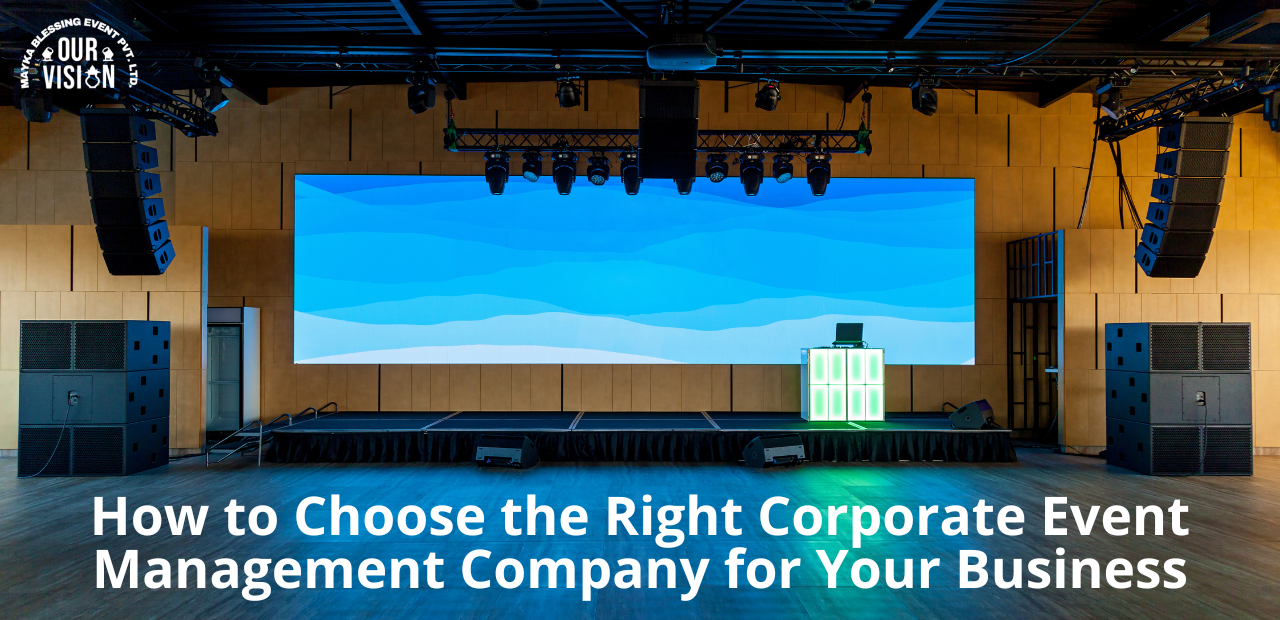How to Choose the Right Corporate Event Management Company for Your Business
Corporate events play a vital role in strengthening brand identity, building client relationships, motivating employees, and showcasing products or services. From conferences and trade shows to gala dinners and team-building retreats, these events require meticulous planning and flawless execution. Choosing the right corporate event management company can make the difference between a successful, memorable event and one that falls short of expectations.
With countless agencies offering event planning services, businesses must carefully evaluate their options to ensure they partner with a company that aligns with their goals, budget, and vision. This article explores the key factors to consider when selecting a corporate event management company, offering practical insights to help businesses make informed decisions.
Understanding the Role of a Corporate Event Management Company
A corporate event management company specializes in planning, organizing, and executing events tailored to business needs. Their responsibilities often include venue selection, vendor coordination, budgeting, logistics, marketing, and on-site management. By leveraging their expertise, businesses can save time, reduce stress, and ensure a professional outcome.
Define Event Objectives and Requirements
Before beginning the search for an event management partner, businesses must clearly define their objectives. Is the event intended to launch a new product, reward employees, attract clients, or enhance brand visibility? Understanding the purpose of the event helps in identifying the type of expertise required.
Additionally, businesses should outline specific requirements such as the number of attendees, preferred location, budget range, and desired outcomes. Having a clear vision ensures that the chosen company can deliver tailored solutions.
Related Read: How Far in Advance Should I Plan a Corporate Event?
Evaluate Experience and Expertise
Experience is one of the most critical factors when choosing an event management partner. Companies with a proven track record in handling corporate events are more likely to anticipate challenges, manage logistics efficiently, and deliver high-quality results.
When evaluating potential partners, businesses should review their portfolio, case studies, and client testimonials. It is also important to assess whether the company has experience in organizing events similar in scale and type to the one being planned.
Assess Creativity and Innovation
Corporate events should not only be well-organized but also engaging and memorable. A reliable event management company brings creativity and innovation to the table, offering unique ideas for themes, décor, entertainment, and attendee engagement.
During the selection process, businesses should ask potential partners to share examples of creative solutions they have implemented in past events. This helps gauge their ability to think outside the box and deliver experiences that stand out.
Check Vendor and Venue Networks
Strong relationships with vendors and venues are a hallmark of a reputable event management company. These connections often translate into better pricing, priority service, and access to exclusive locations.
Businesses should inquire about the company’s vendor network, including caterers, audiovisual providers, decorators, and entertainers. A well-connected company can secure high-quality services within budget and ensure smooth coordination among all stakeholders.
Transparency in Budgeting and Costs
Budget is a crucial consideration in event planning. A trustworthy corporate event management company provides transparent cost estimates and ensures there are no hidden charges. They should be able to work within the client’s budget while maximizing value through efficient resource allocation and vendor negotiations.
Businesses should request detailed proposals that outline all expenses, including venue, catering, décor, entertainment, and contingency costs. Comparing proposals from multiple companies helps in identifying the most cost-effective option without compromising quality.
Evaluate Communication and Responsiveness
Effective communication is essential for successful collaboration. The chosen event management company should be responsive, proactive, and willing to listen to the client’s ideas and concerns. Regular updates, clear timelines, and open channels of communication ensure that both parties remain aligned throughout the planning process.
During initial interactions, businesses should assess how quickly the company responds to inquiries and how clearly they explain their processes. A company that values communication is more likely to deliver a seamless experience.
Consider Technology and Tools
Modern corporate events often incorporate technology to enhance attendee engagement and streamline logistics. From event apps and virtual platforms to live streaming and interactive tools, technology plays a significant role in creating impactful experiences.
Businesses should evaluate whether the event management company is equipped with the latest tools and has experience in managing hybrid or virtual events if required. A tech-savvy partner can elevate the event and provide valuable data insights for post-event analysis.
Risk Management and Contingency Planning
Unexpected challenges are inevitable in event planning, whether it’s a vendor cancellation, technical failure, or weather disruption. A reliable event management company prepares for such scenarios with comprehensive contingency plans.
Businesses should ask potential partners about their approach to risk management and how they handle emergencies. A company with strong problem-solving skills ensures that the event continues smoothly despite unforeseen obstacles.
Reputation and References
Reputation is a strong indicator of reliability and professionalism. Businesses should research online reviews, ratings, and testimonials to gauge the company’s credibility. Additionally, requesting references from past clients provides firsthand insights into their performance, reliability, and ability to deliver results.
A company with a solid reputation is more likely to uphold high standards and prioritize client satisfaction.
Cultural Fit and Understanding of Brand
Every corporate event is an extension of the company’s brand identity. The chosen event management partner should understand the company’s culture, values, and goals to create an event that aligns with its image.
During discussions, businesses should evaluate whether the company demonstrates an understanding of their brand and can translate it into event design, messaging, and overall experience. A strong cultural fit ensures that the event resonates with both internal and external stakeholders.
Post-Event Support and Evaluation
The role of an event management company does not end when the event concludes. Post-event support, such as feedback collection, performance analysis, and reporting, is essential for measuring success and identifying areas for improvement.
Businesses should choose a partner that offers comprehensive post-event evaluation services. This ensures that the event’s impact is assessed and valuable insights are gathered for future planning.
Conclusion
Selecting the right corporate event management company is a strategic decision that can significantly influence the success of a business event. By considering factors such as experience, creativity, vendor networks, budgeting transparency, communication, technology, risk management, and cultural fit, businesses can identify a partner that aligns with their goals and delivers exceptional results.
A well-chosen event management company not only ensures flawless execution but also enhances brand reputation, strengthens relationships, and creates memorable experiences for attendees. In today’s competitive business environment, investing time and effort into choosing the right partner is essential for maximizing the value of corporate events.

